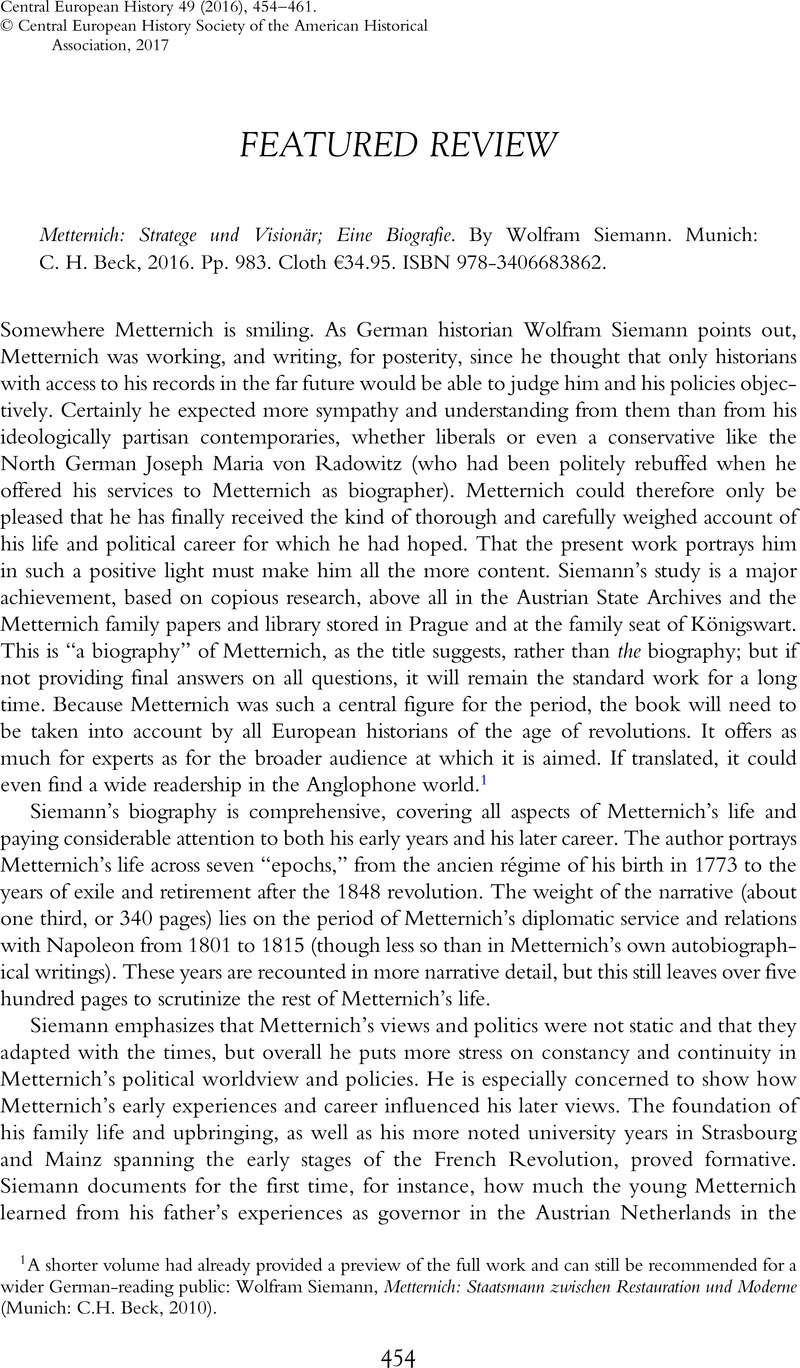No CrossRef data available.
Published online by Cambridge University Press: 18 January 2017

1 A shorter volume had already provided a preview of the full work and can still be recommended for a wider German-reading public: Siemann, Wolfram, Metternich: Staatsmann zwischen Restauration und Moderne (Munich: C.H. Beck, 2010)CrossRefGoogle Scholar.
2 Siemann argues that judgments of “the so-called Metternich system” and of the Carlsbad Decrees “stand or fall” on the question of how far Metternich and the rulers were reacting to “real threats.” Siemann, Wolfram, Metternich: Stratege und Visionär; Eine Biografie (Munich, C. H. Beck, 2016), 642 CrossRefGoogle Scholar. All subsequent references to Siemann are to this volume.
3 For a nuanced treatment of the links and flow of ideas among revolutionary movements in countries ranging from France and Spain to Italy, Greece, and Russia in the 1820s, see Stites, Richard, The Four Horsemen: Riding to Liberty in Post-Napoleonic Europe (Oxford: Oxford University Press, 2014)Google Scholar.
4 Siemann, Metternich, 778–79.
5 Sked, Alan, Metternich and Austria: An Evaluation (Basingstoke: Palgrave Macmillan, 2008), 2–6, 9–11, 21–23Google Scholar.
6 On Metternich's support for limited reforms and desire to avoid overzealous reactionary measures, see Vick, Brian E., The Congress of Vienna: Power and Politics after Napoleon (Cambridge, MA: Harvard University Press, 2014), 240, 246–47, 249–52Google Scholar, and the literature cited there.
7 On balance, the shorter version of Siemann's biography places more emphasis on this revision of Metternich's political views. For “consultative monarchy,” see Ghisalberti, Carlo, Dall'antico regime al 1848: Le origini costituzionali dell'Italia moderna (Bari: Laterza, 1987), 124–41Google Scholar; Daum, Werner, introduction to Handbuch der europäischen Verfassungsgeschichte im 19. Jahrhundert: Institutionen und Rechtspraxis im gesellschaftlichen Wandel, ed. Daum, Werner et al. ., vol. 2, 1815–1847 (Bonn: Dietz, 2012), 75–79 Google Scholar.
8 See, e.g., Applegate, Celia, A Nation of Provincials: The German Idea of Heimat (Berkeley: University of California Press, 1990)Google Scholar; Green, Abigail, Fatherlands: State-Building and Nationhood in Nineteenth-Century Germany (Cambridge: Cambridge University Press, 2001)Google Scholar; Aaslestad, Katherine B., Place and Politics: Local Identity, Civic Culture, and German Nationalism in North Germany during the Revolutionary Era (Leiden: Brill, 2005)Google Scholar; Planert, Ute, Der Mythos vom Befreiungskrieg: Frankreichs Kriege und der deutsche Süden; Alltag—Wahrnehmung—Deutung 1792–1841 (Paderborn: Schöningh, 2007)Google Scholar. On the role of composite monarchies, see Elliott, J. H., “A Europe of Composite Monarchies,” Past & Present 137 (1992): 48–71 Google Scholar.
9 Siemann, Metternich, 624–27, following Haas, Arthur G., Metternich, Reorganization, and Nationality, 1813–1818: A Story of Foresight and Frustration in the Rebuilding of the Austrian Empire (Wiesbaden: Steiner, 1963)Google Scholar; Sked, Metternich and Austria, 107–22.
10 Vick, Brian E., Defining Germany: The 1848 Frankfurt Parliamentarians and National Identity (Cambridge, MA: Harvard University Press, 2002), 110–38Google Scholar.
11 Moritsch, Andreas, ed., Der Austroslavismus: Ein verfrühtes Konzept zur politischen Neugestaltung Mitteleuropas (Vienna: Böhlau, 1996)Google Scholar; Judson, Pieter M., The Habsburg Empire: A New History (Cambridge, MA: Harvard University Press, 2016)CrossRefGoogle Scholar; Judson, Guardians of the Nation: Activists on the Language Frontiers of Imperial Austria (Cambridge, MA: Harvard University Press, 2006)Google Scholar; King, Jeremy, Budweisers into Czechs and Germans: A Local History of Bohemian Politics, 1848–1948 (Princeton, NJ: Princeton University Press, 2006)Google Scholar; Bjork, James E., Neither German nor Pole: Catholicism and National Indifference in a Central European Borderland (Ann Arbor: University of Michigan Press, 2008)Google Scholar; Zahra, Tara, Kidnapped Souls: National Indifference and the Battle for Children in the Bohemian Lands, 1900–1948 (Ithaca, NY: Cornell University Press, 2008)Google Scholar.
12 Schroeder, Paul W., The Transformation of European Politics, 1763–1848 (Oxford: Clarendon Press, 1994)Google Scholar.
13 Siemann, Metternich, 376, 378, 386, 398–400, 435–36, 450–60; Sked, Metternich and Austria, 54–63.
14 Schroeder, Transformation, 459, 461; Siemann, Metternich, 459.
15 Siemann, Metternich, 504; Schroeder, Paul W., Metternich's Diplomacy at its Zenith, 1820–1823 (Austin: University of Texas Press, 1962)Google Scholar.
16 Sked, Metternich and Austria, 45–46; Kraehe, Enno E., Metternich's German Policy, vol. 1, The Contest with Napoleon, 1799–1814 (Princeton, NJ: Princeton University Press, 1980), esp. chaps. 6, 8–10 Google Scholar. For claims that the decision for war had not yet come down by June 1813 and that it was not a given that Napoleon must be deposed, see Sauvigny, Guillaume Bertier de, Metternich (Paris: Fayard, 1986), 153 Google Scholar.
17 Tulard, Jean, Napoleon: The Myth of the Saviour, trans. Waugh, Teresa (London: Weidenfeld and Nicolson, 1984)Google Scholar; Dwyer, Philip, Napoleon: The Path to Power (New Haven, CT: Yale University Press, 2008)Google Scholar; Dwyer, Citizen Emperor: Napoleon in Power (New Haven, CT: Yale University Press, 2013)Google Scholar; Forrest, Alan, Napoleon (London: Quercus, 2011)Google Scholar; Broers, Michael, Europe under Napoleon, 1796–1815 (London: Arnold, 1996)Google Scholar; Woolf, Stuart, Napoleon's Integration of Europe (New York: Routledge, 1991)Google Scholar. On Prussian politics in this era, see, e.g., Simms, Brendan, The Impact of Napoleon: Prussian High Politics, Foreign Policy, and the Crisis of the Executive, 1797–1806 (Cambridge: Cambridge University Press, 1997)CrossRefGoogle Scholar; Stamm-Kuhlmann, Thomas, König in Preussens grosser Zeit: Friedrich Wilhelm III., der Melancholiker auf dem Thron (Berlin: Siedler, 1992)Google Scholar; Levinger, Matthew, Enlightened Nationalism: The Transformation of Prussian Political Culture, 1806–1848 (New York: Oxford University Press, 2000)Google Scholar; Clark, Christopher, Iron Kingdom: The Rise and Downfall of Prussia, 1600–1947 (London: Penguin, 2007), 284–391 Google Scholar. For Russian politics in this period, see Hartley, Janet M., Alexander I (London: Longman, 1994)Google Scholar; Eich, Ulrike, Russland und Europa: Studien zur russischen Deutschlandpolitik in der Zeit des Wiener Kongresses (Cologne: Böhlau, 1986)Google Scholar; Grimsted, Patricia Kennedy, The Foreign Ministers of Alexander I: Political Attitudes and the Conduct of Russian Diplomacy, 1801–1825 (Berkeley: University of California Press, 1969)Google Scholar.
18 Srbik, Heinrich Ritter von, Metternich: der Staatsmann und der Mensch, 2 vols., 2nd ed. (Munich: Bruckmann, 1957)Google Scholar.
19 Sked, Metternich and Austria, 3, 22.
20 On Gentz as Metternich's “tool,” see Siemann, Metternich, 401.